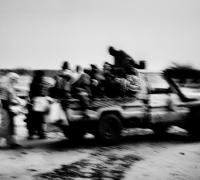The long shadow of the border: Lives, limits, longings

Mobility has become the quintessential marker of socio-economic hierarchies in late modernity, Zygmunt Baumann noted more than twenty years ago. This observation is ever more relevant in a time shaped by the COVID-19 pandemic and global border closures as some can travel anywhere they like while others must stay in the place they happen to be born – though the need to see change is increasingly urgent on a global scale. During a three-day workshop in Gilleleje, Denmark, August 18–20, 2021 an international panel of researchers discussed the many ways in which safe and legal mobility is progressively curbed or kept alive, and how the human, social, and political conditions of people on the move are severely challenged in the process.
Focusing on borders, bordering, and border work, the aim of the workshop was to discuss how new borders are constantly proliferating to divide and separate people, how borders are atomized and internalized, inside and outside nation states. And how people work both sides of the border by inventing new policies and technologies and interventions to stop people from moving from poorer to richer regions, while migrants, refuges, and facilitators seek to circumvent these obstacles, often with fatal consequences. Those who make it across, live in the long shadow of the omnipresent border, in a signposted universe, likely to be working and living on terms that would be unacceptable to the host population. Yet, most find ways to persevere, to rewrite and contest their fates, even if some reach breaking points and give up.
What does this situation tell us about the current state of the global world and what are the consequences for people on the move? In what ways are social and spatial imaginaries in Europe and the US and elsewhere entangled in notions of race, class, and ethnicity and connected to a border dreamworld that is contested and reshaped by social and political realities on the ground and resisted by local actors – migrants as well as local authorities – that have agendas of their own. How may this be connected to colonial imaginaries and present and historical fantasies of the other half of the globe as territories and bodies, waiting for order and governance? And how, on an everyday level, does the long shadow of the border impact migrant lives on the road and long after arrival in reluctant if not hostile host countries? These were some of the critical questions the Borderwork Research project invited the participants to reflect on during short empirical presentations followed by discussions.
Workshop participants and presented papers
Ahlam Chemlali, DIIS: Everyday Violence in the Borderlands: Migrant women in transit from Africa to Europe
Hans Lucht, DIIS: The Effects of EU Driven Border Control in Niger: from Migrants to Gold, Drugs, and Rare Animals
Ida Marie Savio Vammen, DIIS: Rebranding migration and framing new beginnings to stop unwanted migration in Senegal
Jesper Bjarnesen, NAI: Infrastructural violence/resistance in West Africa
Kenneth Nsah, Aarhus University: Literary Texts and Borderwork: The Case of “Bush Fallers” in Anglophone Cameroonian Literature
Mirjam de Bruijn, Leiden University: Internal border making in Mali, the fate of displace people
Philippe Bourgois, UCLA: The Synthetic Industrialization of Narcotics Production in the Americas During Covid: The Logics of Criminalization and Colonial/Neo-Colonial Domination in the Era of Globalized Predatory Neoliberal Accumulation
Phillippe Frowd, University of Ottawa: Quasilegality and migrant smuggling in northern Niger
Signe Marie Cold-Ravnkilde, DIIS: Asymmetrical knowledge transfers in transnational security governance in the Sahel
Tekalign Ayalew, Addis Ababa/Stockholm University: COVID-19, border regimes and disruptions of migration movements between Ethiopia and the Gulf States
Wendy Vogt, IUPUI: From Arriaga to Atlanta: Racial Capitalism, Intersectional Violence and (Im)Migrant Resistance in the Americas
DIIS Experts




